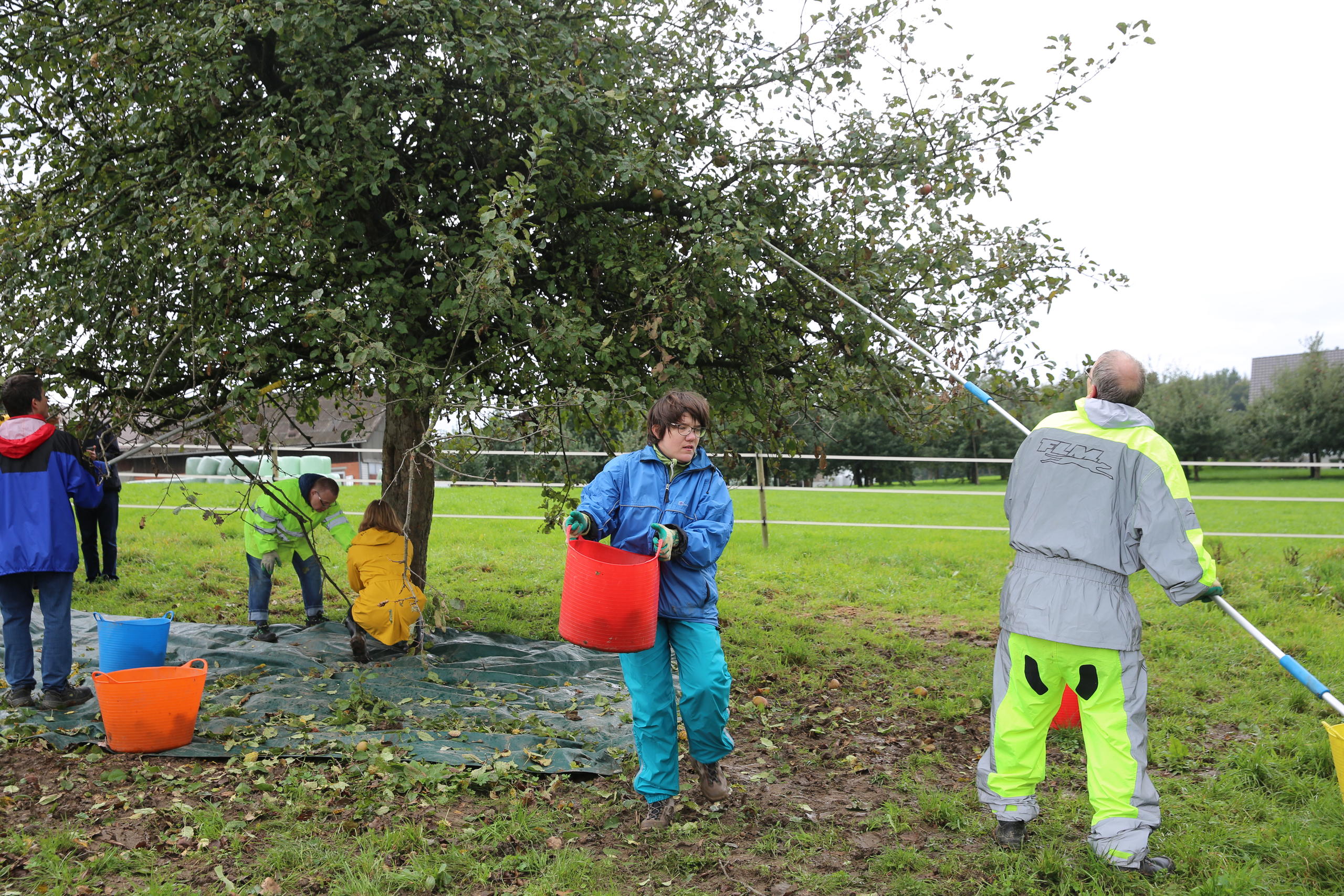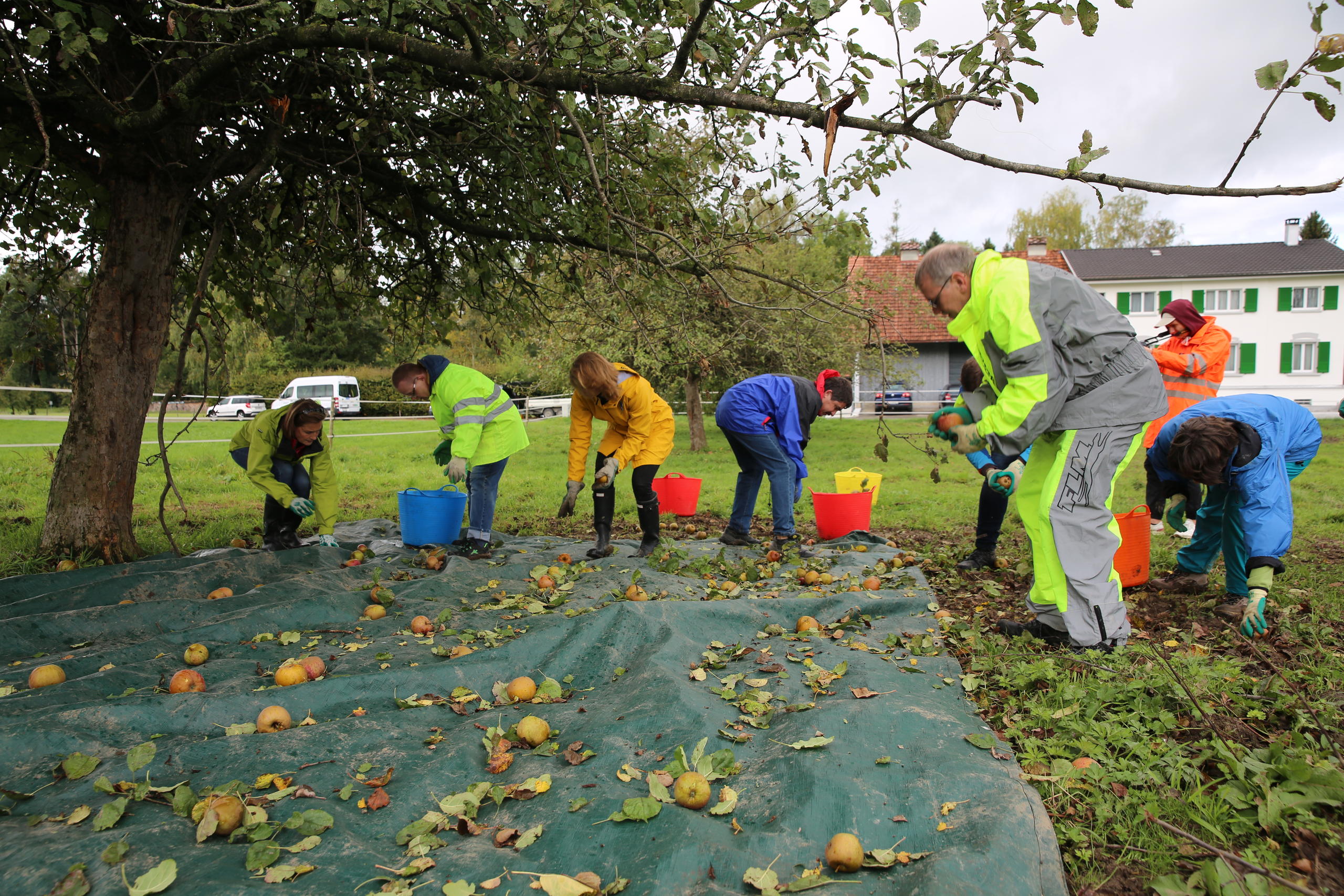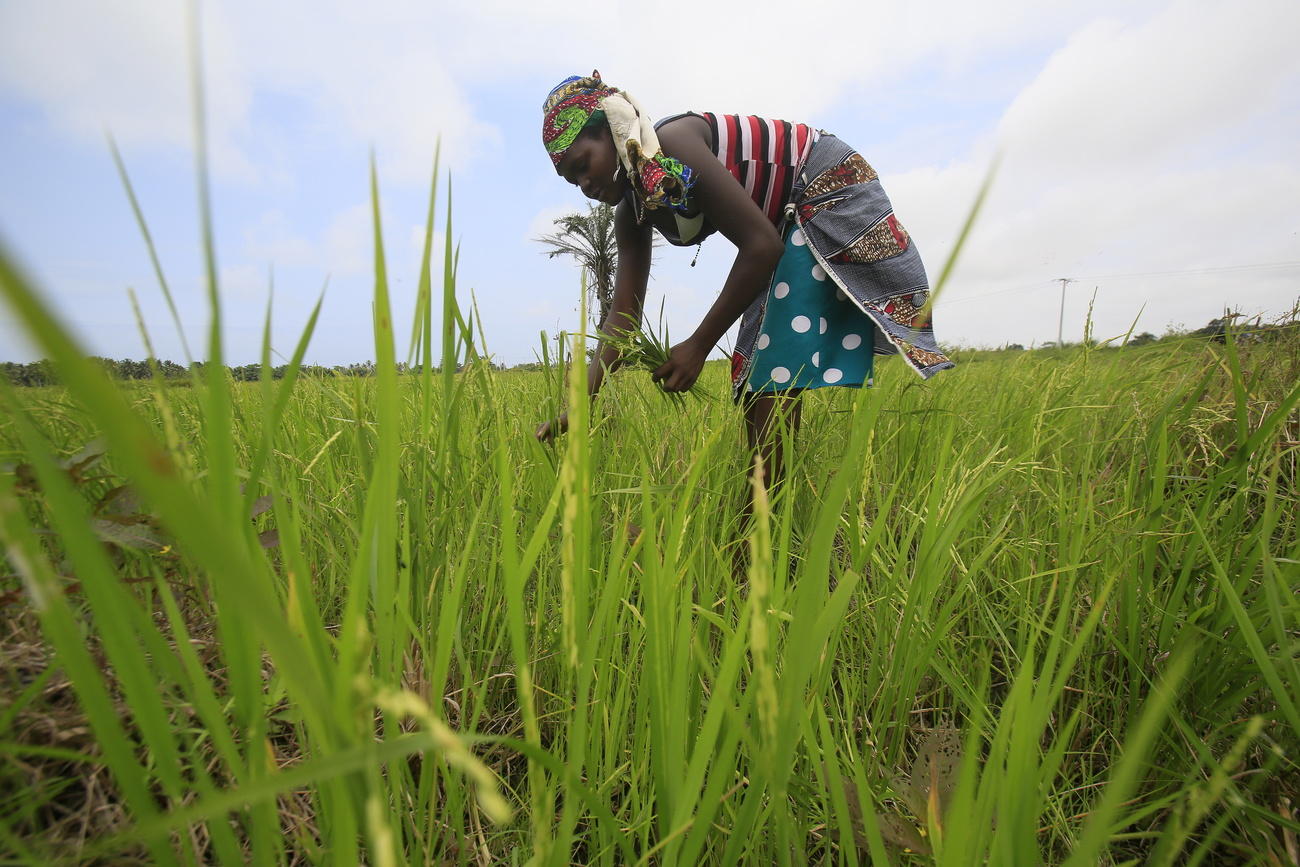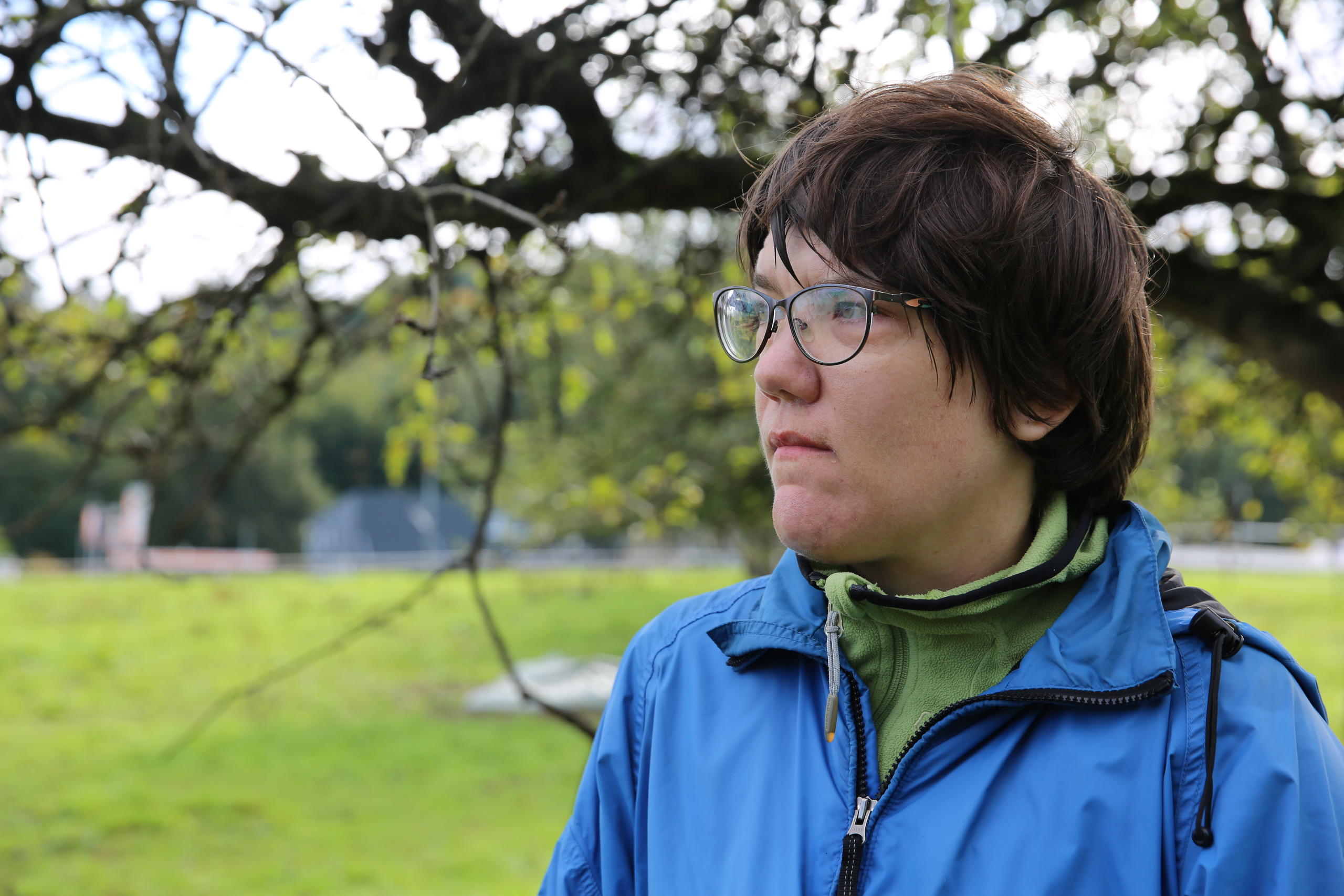
When the fruit of a business goes beyond profit

For evidence of the power of apples to change the world, look no further than Eve, Isaac Newton and Steve Jobs. Gartengold, a Swiss juice company with a business model that’s gaining ground in the country, also believes in the transformative powers of this fruit.
Gartengold’s business model is based on the “three Ps” – profit, people planet – known in management circles as the Triple Bottom Line. The concept is gaining traction among companies in Switzerland.
Planting the seed
When two students went for a jog in the eastern Swiss region of St Gallen many years ago, they couldn’t help but notice the unpicked heaps of apples scattered across meadows, orchards and private gardens. It was the beginning of an idea. Instead of letting them go to waste, they turned to another underused resource – disabled members of society – to pick the apples before turning them into juice.
That is the origin story of Gartengold, which harvested its first apples in 2013 and hopes to eventually turn a profit with its premium apple juice blend. For now, the company is covering part of its operational costs through volunteer work and a bank loan. They hope to become profitable by scaling up.
“We protect biodiversity by harvesting trees that usually wouldn’t be harvested and used anymore,” says Stefan Brügger, who is responsible for sales at Gartengold. Many of the high apple trees that dominate the landscape in eastern Switzerland are very time consuming to harvest. At best, many apples land on the compost heap.
“Elderly people who own such trees might hesitate to keep them, since they need so much work in autumn and, sooner or later, they might decide to cut them down,” explains Brügger.
The company produces its juice using apples donated by private orchard owners in three eastern Swiss cantons. It hopes to expand next season to other parts of the country. Gartengold recruits people to harvest the apples by working with with Valida, a social enterprise that houses and supports people with mental disabilities, as well as similar organisations in and around St Gallen.
“We use apples that are otherwise not used and use the abilities of these people that are poorly used,” says Beda Meier, general manager of Valida. “We bring the two resources together and make a beautiful product. It is not just a job. They create a value that consumers pay a price for.”

More
A Swiss apple juice maker balancing profit with purpose
Triple Bottom Line – another way of measuring value
Gartengold is not alone in its quest to strike a balance between making a profit and having a positive impact on society and the environment. Businesses in Norway and Germany follow a similar apple-centric concept and fit into a broader movement to mainstream the so-called Triple Bottom Line concept [see infobox below].
This movement reflects growing recognition that that some of the world’s most intractable problems – including climate change and structural social inequalities – cannot be solved by governments and non-profits alone; that businesses can be part of the solution rather than labelled as the problem.

More
How Swiss investors are reacting to climate activism
Such purpose-driven companies also court recognition for their efforts in the form of certification. B LabExternal link, which has a hub in Switzerland, offers a certification scheme looking at a company’s performance across 200 criteria. Firms that make the cut in terms of their social and environmental impact are listed as B Corps. All of them pursue a Triple Bottom Line approach, making it a legal requirement.
Changing company DNA
“This [legal requirement] creates a strong and robust framework to make sure that the company is not doing it just for fun and greenwashing,” says Jonathan Normand, director of B Lab Switzerland. “They have integrated this new approach into their DNA.”
While Gartengold has not pursued this certification scheme, the social enterprise is on B Lab’s radar as a “great company”, Normand says. Opaline, another juice company, has earned the highest B Lab certification in Switzerland. The largest certified company is wealth and asset manager Lombard Odier.
In all, there are about 3,100 BCorp companies in 150 industries across 60 countries. Switzerland has 36 External linksuch companies, and more than 50 total are expected to be certified by the end of the year.
“The BCorp movement is taking wings in Switzerland,” says Normand, noting that most of the companies certified in Switzerland are small and medium enterprises (SMEs).
He credits a general cultural shift. Companies are finally moving past the fear of being named and shamed for their activities and are recognising that challenges such as climate change present opportunities for innovation.
Helping to speed up this change, the Swiss government, with the participation of B Lab, will roll out a three-year program to accelerate private sector engagement in addressing the United Nations’ 17 Sustainable Development Goals (SDGs) in 2020. The World Business Council for Sustainable Development estimates that by 2030, some 12 trillion dollars worldwide will be invested in the SDGs.
Switzerland has an advantage in its legal framework which allows for an array of impact- driven enterprises, according to Julie Wynne, an attorney at Swiss law firm FRIORIEP who has written a legal guide on social ventures.External link
“In Switzerland we have a very liberal and flexible legal framework that allows entrepreneurs to use different legal forms and make it suitable for a mission-driven business,” she says.
The last tree of the season
Rain starts to pour as the Gartengold team strips the last apple tree of its bounty. There are moments of laughter – and a few close calls – as people take turns shaking the branches. Apples crash down so hard that they bounce off the tarps laid down to catch them. Rene Wuthrich, who usually works as a courier, says he loves the chance to “get outside and do something different”.
Sybille Zehnder, who alternates between cleaning jobs and assembly line work the rest of the year, was proud that this autumn marked her third harvest. “It’s wonderful,” she declares in confident English with a contagious grin. “I love this job, but the weather is not so good.”

While the volume of apples went down this year – a trend that could pose a challenge if it continues – the interest among corporate volunteers has gone up. Sixty volunteers, primarily drawn from the banking and insurance industries, participated this year compared with 45 in 2018. The volunteers from Valida relish this opportunity to interact with professionals from other walks of life.
Many of the volunteers are younger than 40, as are the consumers that Gartengold and other triple bottom line companies hope to reach. Market research shows that about 70% of consumers belonging to the Millennial generation (those born between 1980 and 2000) – are happy to spend more on brands that support a cause they care about.
“The young generation is much more aware of its consumption,” says Wynne. “We have the advantage that there is a population that has the means not just to survive but also to make choices.”
Switzerland’s favourable economic situation, adds Normand, puts Swiss businesses in a leading position to rethink the purpose of business in addressing social and environmental issues. Contributing to the momentum are the 60% of existing companies that will change hands by 2030 and the fact that Millennials will hold 40% of the assets in circulation.
“We have a historic opportunity to redefine how Swiss businesses operate,” says Normand.
Triple Bottom Line: You are what you measure
John Elkington, the founder of a British consultancy called SustainAbility, coined “the triple bottom line” in 1994 which focused on the three Ps. This accounting approach looks at three distinct bottom lines. One is corporate “profit”. The second is a company’s “people” account – to what extent is the company socially responsible in its operations. And the third account is the “planet” – a measure of environmental impact. Twenty-five years later, in an article published in the Harvard Business ReviewExternal link, Elkington reflected on the term and the collective failure to achieve systemic change.

In compliance with the JTI standards
More: SWI swissinfo.ch certified by the Journalism Trust Initiative






























You can find an overview of ongoing debates with our journalists here . Please join us!
If you want to start a conversation about a topic raised in this article or want to report factual errors, email us at english@swissinfo.ch.